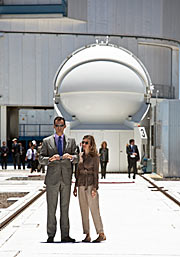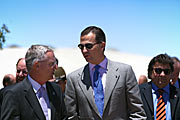Pressemitteilung
Spanischer Kronprinz besucht das Paranal-Observatorium der ESO
24. November 2011
Am 24. November 2011 hatte das Paranal-Observatorium der ESO in Chile die Ehre des Besuches Ihrer Königlichen Hoheiten, des Prinzen und der Prinzessin von Asturien.
Die Delegation, der auch die spanische Ministerin für Wissenschaft und Innovation, Dr. Christina Garmendia, der chilenische Außenminister, Alfredo Moreno, und die chilenische Ministerin für öffentliche Güter, Catalina Parot, angehörten, verfolgte zuerst eine Reihe von Präsentationen über die ESO in der Residencia des Paranal-Observatoriums. An dieser Veranstaltung nahmen auch Vertreter der internationalen Presse teil.
ESO-Generaldirektor Prof. Tim de Zeeuw unterstrich die großen Herausforderungen, die der Bau und der Betrieb von hochmodernen Forschungseinrichtungen an einem der trockensten Orte der Welt an die ESO stellt.
“Es ist mir eine große Ehre, Ihre Königlichen Hoheiten am Paranal-Observatorium willkommen zu heißen”, sagte Prof. de Zeeuw. “Spanien ist ein hochgeschätztes Mitglied der ESO. Die spanische Industrie hat wichtige Beiträge zur Planung und Konstruktion von Einrichtungen der ESO geleistet. Spanische Astronomen nutzen diese weltweit führenden wissenschaftlichen Instrumente auf eindrucksvolle Art und Weise.”
Der spanische Delegierte und Vizepräsident des ESO-Council, Prof. Xavier Barcons, betonte ebenfalls die starke Beteiligung der spanischen Wissenschaftler an den Aktivitäten der ESO. Spanien spielte eine wichtige Rolle bei den Designstudien für das zukünftige E-ELT. Auch umfangreiche Aufträge zur Herstellung von Teilen des Atacama Large Millimeter/submillimeter Array (ALMA) gingen nach Spanien.
Der spanische Astronom und stellvertretende Direktor für den Betrieb bei der ESO, Dr. Fernando Comeron, beschrieb den Gästen einige der herausragenden Entdeckungen, die mit dem Very Large Telescope (VLT) der ESO gemacht wurden. Dazu gehören das erste direkte Bild eines Exoplaneten und die Bestätigung der Existenz eines supermassereichen Schwarzen Lochs im Zentrum der Milchstraße.
Anschließend besichtigten der Prinz und die Prinzessin das VLT, das fortschrittlichste optische Observatorium der Welt. Die Gäste hatten auch die seltene Gelegenheit, die Interferometer-Tunnel unterhalb der Teleskope zu besuchen. In diesen Tunneln werden das von den einzelnen Teleskopen des VLT gesammelte Licht kombiniert. So können Astronomen bis zu 17 mal kleinere Details in astronomischen Objekten beobachten als mit den jeweiligen Einzelteleskopen.
Bei einer Führung durch den Kontrollraum des VLT erklärten spanische ESO-Astronomen den bedeutenden Gästen den Betrieb der Teleskope.
Der Abgesandte der ESO in Chile, Prof. Massimo Tarenghi, und der Direktor des Observatoriums, Dr. Andreas Kaufer, waren ebenfalls Gastgeber des Besuchs des Prinzen und der Prinzessin von Asturien.
Spanien ist der ESO im Jahr 2006 beigetreten. Zur Zeit sind 32 spanische Staatsbürger bei der ESO beschäftigt.
Weitere Informationen
Die Europäische Südsternwarte ESO (European Southern Observatory) ist die führende europäische Organisation für astronomische Forschung und das wissenschaftlich produktivste Observatorium der Welt. Getragen wird die Organisation durch ihre 15 Mitgliedsländer: Belgien, Brasilien, Dänemark, Deutschland, Finnland, Frankreich, Italien, die Niederlande, Österreich, Portugal, Spanien, Schweden, die Schweiz, die Tschechische Republik und das Vereinigte Königreich. Die ESO ermöglicht astronomische Spitzenforschung, indem sie leistungsfähige bodengebundene Teleskope entwirft, konstruiert und betreibt. Auch bei der Förderung internationaler Zusammenarbeit auf dem Gebiet der Astronomie spielt die Organisation eine maßgebliche Rolle. Die ESO betreibt drei weltweit einzigartige Beobachtungsstandorte in Nordchile: La Silla, Paranal und Chajnantor. Auf dem Paranal betreibt die ESO mit dem Very Large Telescope (VLT) das weltweit leistungsfähigste Observatorium für Beobachtungen im Bereich des sichtbaren Lichts und zwei Teleskope für Himmelsdurchmusterungen: VISTA, das größte Durchmusterungsteleskop der Welt, arbeitet im Infraroten, während das VLT Survey Telescope (VST) für Himmelsdurchmusterungen ausschließlich im sichtbaren Licht konzipiert ist. Die ESO ist der europäische Partner für den Aufbau des Antennenfelds ALMA, das größte astronomische Projekt überhaupt. Derzeit entwickelt die ESO ein Großteleskop der 40-Meter-Klasse für Beobachtungen im Bereich des sichtbaren und Infrarotlichts, das einmal das größte optische Teleskop der Welt werden wird, das European Extremely Large Telescope (E-ELT).
Die Übersetzungen von englischsprachigen ESO-Pressemitteilungen sind ein Service des ESO Science Outreach Network (ESON), eines internationalen Netzwerks für astronomische Öffentlichkeitsarbeit, in dem Wissenschaftler und Wissenschaftskommunikatoren aus allen ESO-Mitgliedsstaaten (und einigen weiteren Ländern) vertreten sind. Deutscher Knoten des Netzwerks ist das Haus der Astronomie in Heidelberg.
Links
Kontaktinformationen
Massimo Tarenghi
ESO Representative in Chile
Santiago, Chile
Tel: +56 2 463 3143
E-Mail: mtarengh@eso.org
Gonzalo Argandoña
ESO education and Public Outreach Department
Santiago, Chile
Tel: +56 2 463 3258
Mobil: +56 9 9 829 4202
E-Mail: gargando@eso.org
Douglas Pierce-Price
ESO education and Public Outreach Department
Garching bei München, Germany
Tel: +49 89 3200 6759
E-Mail: dpiercep@eso.org
Peter Habison (Pressekontakt Österreich)
ESO Science Outreach Network
und stem & mint e.U. – Space and Science Communications
Vienna, Austria
Tel: +43 676 648 7003
E-Mail: eson-austria@eso.org
Über die Pressemitteilung
| Pressemitteilung Nr.: | eso1146de-at |
| Name: | Auxiliary Telescopes, Paranal, Site visit, Very Large Telescope |
| Typ: | Unspecified : People : Other/General |
| Facility: | Very Large Telescope |
Our use of Cookies
We use cookies that are essential for accessing our websites and using our services. We also use cookies to analyse, measure and improve our websites’ performance, to enable content sharing via social media and to display media content hosted on third-party platforms.
ESO Cookies Policy
The European Organisation for Astronomical Research in the Southern Hemisphere (ESO) is the pre-eminent intergovernmental science and technology organisation in astronomy. It carries out an ambitious programme focused on the design, construction and operation of powerful ground-based observing facilities for astronomy.
This Cookies Policy is intended to provide clarity by outlining the cookies used on the ESO public websites, their functions, the options you have for controlling them, and the ways you can contact us for additional details.
What are cookies?
Cookies are small pieces of data stored on your device by websites you visit. They serve various purposes, such as remembering login credentials and preferences and enhance your browsing experience.
Categories of cookies we use
Essential cookies (always active): These cookies are strictly necessary for the proper functioning of our website. Without these cookies, the website cannot operate correctly, and certain services, such as logging in or accessing secure areas, may not be available; because they are essential for the website’s operation, they cannot be disabled.
Functional Cookies: These cookies enhance your browsing experience by enabling additional features and personalization, such as remembering your preferences and settings. While not strictly necessary for the website to function, they improve usability and convenience; these cookies are only placed if you provide your consent.
Analytics cookies: These cookies collect information about how visitors interact with our website, such as which pages are visited most often and how users navigate the site. This data helps us improve website performance, optimize content, and enhance the user experience; these cookies are only placed if you provide your consent. We use the following analytics cookies.
Matomo Cookies:
This website uses Matomo (formerly Piwik), an open source software which enables the statistical analysis of website visits. Matomo uses cookies (text files) which are saved on your computer and which allow us to analyze how you use our website. The website user information generated by the cookies will only be saved on the servers of our IT Department. We use this information to analyze www.eso.org visits and to prepare reports on website activities. These data will not be disclosed to third parties.
On behalf of ESO, Matomo will use this information for the purpose of evaluating your use of the website, compiling reports on website activity and providing other services relating to website activity and internet usage.
Matomo cookies settings:
Additional Third-party cookies on ESO websites: some of our pages display content from external providers, e.g. YouTube.
Such third-party services are outside of ESO control and may, at any time, change their terms of service, use of cookies, etc.
YouTube: Some videos on the ESO website are embedded from ESO’s official YouTube channel. We have enabled YouTube’s privacy-enhanced mode, meaning that no cookies are set unless the user actively clicks on the video to play it. Additionally, in this mode, YouTube does not store any personally identifiable cookie data for embedded video playbacks. For more details, please refer to YouTube’s embedding videos information page.
Cookies can also be classified based on the following elements.
Regarding the domain, there are:
- First-party cookies, set by the website you are currently visiting. They are stored by the same domain that you are browsing and are used to enhance your experience on that site;
- Third-party cookies, set by a domain other than the one you are currently visiting.
As for their duration, cookies can be:
- Browser-session cookies, which are deleted when the user closes the browser;
- Stored cookies, which stay on the user's device for a predetermined period of time.
How to manage cookies
Cookie settings: You can modify your cookie choices for the ESO webpages at any time by clicking on the link Cookie settings at the bottom of any page.
In your browser: If you wish to delete cookies or instruct your browser to delete or block cookies by default, please visit the help pages of your browser:
Please be aware that if you delete or decline cookies, certain functionalities of our website may be not be available and your browsing experience may be affected.
You can set most browsers to prevent any cookies being placed on your device, but you may then have to manually adjust some preferences every time you visit a site/page. And some services and functionalities may not work properly at all (e.g. profile logging-in, shop check out).
Updates to the ESO Cookies Policy
The ESO Cookies Policy may be subject to future updates, which will be made available on this page.
Additional information
For any queries related to cookies, please contact: pdprATesoDOTorg.
As ESO public webpages are managed by our Department of Communication, your questions will be dealt with the support of the said Department.






